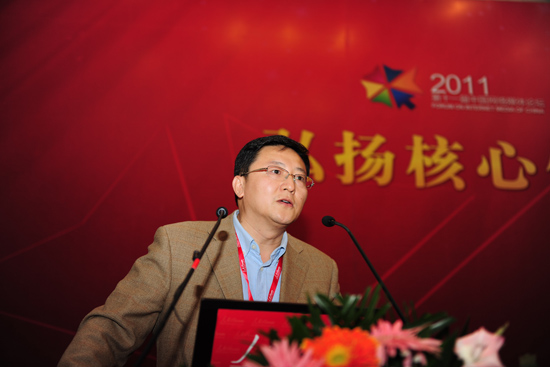Internet 'key for China-India exchange'
- By Zhang Ming'ai
 0 Comment(s)
0 Comment(s) Print
Print E-mail
China.org.cn, November 22, 2011
E-mail
China.org.cn, November 22, 2011
Internet media should play a greater role in breaking the "glass wall" of information exchange between China and India, China.org.cn Vice President Wang Xiaohui said Monday.
 |
|
China.org.cn Vice President Wang Xiaohui speaks at the 11th China Internet Media Forum in Wuhan, November 21, 2011. |
Wang made the remarks while speaking at the 11th China Internet Media Forum held in Wuhan. The two-day event aimed to push forward the development of online media and promote the prosperity of the Web culture.
Wang said the Internet, along with its derivative technologies and applications, infuses today's media with the timeliness, immersion, interactivity, and interconnectivity that traditional media cannot match.
In recent years, high level officials from the two countries have traded visits that aimed at improving relations. In 2010, their cross-border commerce reached a total volume of US$60 billion, while two-way investment increased 10 folds over the past two years. Elsewhere, the two countries witnessed increased cooperation and coordination in international affairs. China joined hands with India and other countries in the Doha Round talks to protect the interests of developing countries.
"Compared with their economic and trade relations, the information flow between China and India seems not quite smooth," Wang said.
During a trip to India as a Chinese media delegate in August, Wang visited six major bookstores in New Delhi and Bengaluru and tried to find books about China. He was only able to find three kinds of books.
Wang said Indian people's understanding of China only comes from reports influenced by western media or those of foreign observers visiting China. "They have no way to learn about the real China."
He said the only reports about China he saw on Indian TV during his ten-day trip were two news items about the country's food safety problems.
A China Internet development report showed that in June, the country's Internet users hit 485 million. The Internet Mobile Association of India (IAMAI) announced on Nov. 8 that Internet users in India reached 112 million, with a monthly growth of 5 to 7 million, leading experts to predict that the number will overtake that of the U.S. in two years.
But although online media exchange should be natural for the two neighboring countries with two of the world's biggest populations, Wang said India's print and broadcast media are heavily influenced by the West. He said the most influential news channels in India are joint ventures with either CNN or BBC, such as CNN-IBN.
The Internet and mobile devices have broken the boundaries of traditional media, Wang said. Web users in India interested in learning about China can access the country's own media websites such as China.org.cn, Peopledaily.com.cn, Xinhuanet.com and Cntv.com. They are free to surf for information or publish their opinions just like a Chinese netizen.
Wang said Chinese netizens should be effectively guided to respond objectively to inaccurate media reports in India that are biased against China, which would in turn amplify China's voice on the world stage.
He called on China's mainstream media, especially those targeting foreign audiences, to formulate long term promotional plans through trade exchanges, high level official visits and such events as "culture year" and "exchange year" with India.
Meanwhile, Wang urged the media agencies to take advantage of the special properties of the Internet and enable more users in China and India to connect on major news websites. This way, Wang said the two people could increase mutual understanding and deepen friendship, laying down the cornerstone of trust between these two countries.






Go to Forum >>0 Comment(s)